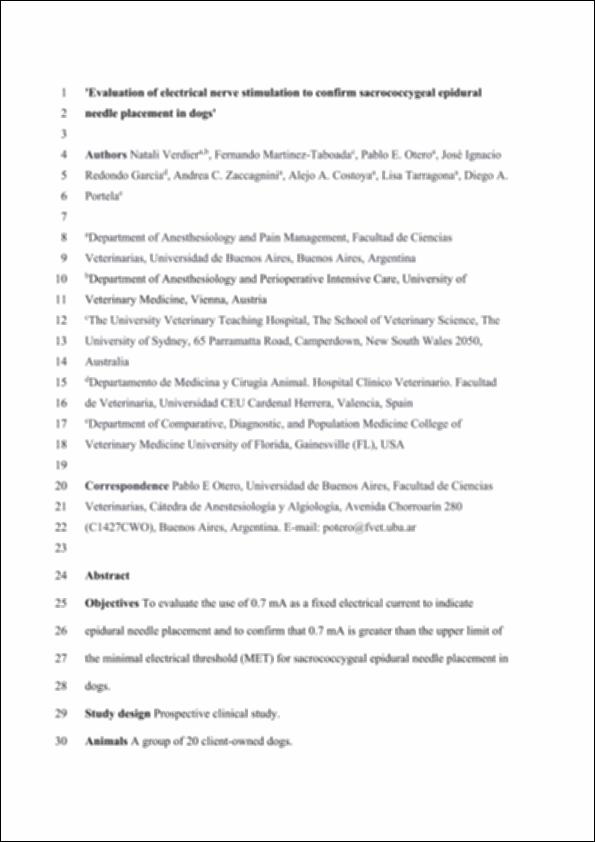Por favor, use este identificador para citar o enlazar este ítem:
http://hdl.handle.net/10637/13923Evaluation of electrical nerve stimulation to confirm sacrococcygeal epidural needle placement in dogs
| Título : | Evaluation of electrical nerve stimulation to confirm sacrococcygeal epidural needle placement in dogs |
| Autor : | Verdier, Natali Martínez Taboada, Fernando Otero, Pablo E. Redondo García, José Ignacio Zaccagnini, Andrea S. Costoya, Alejo A. |
| Materias: | Analgesia veterinaria.; Analgesia (Veterinary); Anestesia veterinaria.; Dogs - Anesthesia.; Veterinary anesthesia.; Perros - Anestesia. |
| Editorial : | Elsevier |
| Citación : | Verdier, N., Martinez-Taboada, F., Otero, P. E., Redondo García, J. I., Zaccagnini, A. S., Costoya, A. A., Tarragona, L. & Portela, D. A. (2021). Evaluation of electrical nerve stimulation to confirm sacrococcygeal epidural needle placement in dogs. Veterinary Anaesthesia and Analgesia, vol. 48, i. 4 (jul.), pp. 612–616. DOI: https://doi.org/10.1016/j.vaa.2020.12.008 |
| Resumen : | Objectives: To evaluate the use of 0.7 mA as a fixed electrical current to indicate epidural needle placement and to confirm that 0.7 mA is greater than the upper limit of the minimal electrical threshold (MET) for sacrococcygeal epidural needle placement in dogs. Study design: Prospective clinical study. Animals: A group of 20 client-owned dogs. Methods: During general anaesthesia and with standard monitoring, the presence of the 3patellar reflex was confirmed in all dogs. An insulated needle was inserted through the sacrococcygeal intervertebral junction and absence of tail movement was confirmed when a fixed electrical current of 0.7 mA was applied. Then, the needle was further advanced towards the epidural space until the expected motor response was obtained – the 'nerve stimulation test' (NST). The NST was considered positive when a motor response of the muscles of the tail was elicited but not the perineal muscles, whereas it was considered negative when no movement of the tail was evoked. The electrical current was turned to 0 mA and then increased by 0.01 mA increments until tail movement was evoked, this was recorded as the MET. In the positive NST cases, 0.05 mL cm-1 occipitococcygeal length of 2% lidocaine or 0.25-0.5% bupivacaine was administered. Epidural blockade was confirmed by the loss of patellar reflex. Descriptive statistics were used to present data. Results: Sacrococcygeal epidural needle placement, corroborated by loss of the patellar reflex, was correctly predicted in 89.5% (95% confidence interval: 68.6%-97.1%) of the cases. The MET was 0.22 mA (0.11-0.36). Conclusions and clinical relevance: A current of 0.7 mA is approximately twice the upper limit of the MET for epidural placement. Therefore, this study demonstrates, with a success rate of 89.5%, the adequacy of using 0.7 mA as the fixed electrical current to detect sacrococcygeal epidural needle placement in dogs. |
| Descripción : | Este artículo se encuentra disponible en la siguiente URL: https://www.sciencedirect.com/science/article/abs/pii/S1467298721000611?via%3Dihub En este artículo de investigación también participan: Lisa Tarragona y Diego A. Portela. Este es el pre-print del siguiente artículo: Verdier, N., Martinez-Taboada, F., Otero, P. E., Redondo García, J. I., Zaccagnini, A. S., Costoya, A. A., Tarragona, L. & Portela, D. A. (2021). Evaluation of electrical nerve stimulation to confirm sacrococcygeal epidural needle placement in dogs. Veterinary Anaesthesia and Analgesia, vol. 48, i. 4 (jul.), pp. 612?616, que se ha publicado de forma definitiva en https://doi.org/10.1016/j.vaa.2020.12.008. This is the pre-peer reviewed version of the following article: Verdier, N., Martinez-Taboada, F., Otero, P. E., Redondo García, J. I., Zaccagnini, A. S., Costoya, A. A., Tarragona, L. & Portela, D. A. (2021). Evaluation of electrical nerve stimulation to confirm sacrococcygeal epidural needle placement in dogs. Veterinary Anaesthesia and Analgesia, vol. 48, i. 4 (jul.), pp. 612?616, which has been published in final form at https://doi.org/10.1016/j.vaa.2020.12.008. |
| URI : | http://hdl.handle.net/10637/13923 |
| Derechos: | http://creativecommons.org/licenses/by-nc-nd/4.0/deed.es |
| ISSN : | 1467-2987 1467-2995 (Electrónico) |
| Fecha de publicación : | 24-jul-2021 |
| Centro : | Universidad Cardenal Herrera-CEU |
| Aparece en las colecciones: | Dpto. Medicina y Cirugía Animal |
Los ítems de DSpace están protegidos por copyright, con todos los derechos reservados, a menos que se indique lo contrario.


